The Glass Castle is Jeannette Walls' best-selling memoir about her fascinating survival of an unconventional childhood. Explore a character analysis of Jeannette, plot. Athena Glass is fragile while castle is strong. Glass castle is a metaphor for her upbringing: she had a chaotic and unstable childhood, but she also developed strengths from these experiences. Glass castle feels like an amazing promise that will never be fulfilled, but there is still beauty to it, just like all her parents' idealism. Six months into his job, Dad loses it, although he insists he did so purposefully so he can focus on searching for gold. The children realize food is going to be scarce, and Jeannette and Brian take to scavenging. We see self-reliance in the children in The Glass Castle. Jeannette and her siblings were dragged around wherever the parents went, but got very little help from their parents. One example early in the book was that Jeannette was making hot dogs for herself when she was only three years old. She had to do this because her mother was painting. Glass Castle As the title of the memoir, this symbol could easily sum up most of the tensions in and interests of the book. The Glass Castle symbolizes the illusions that Jeannette must release in order to read analysis of Glass Castle.
Free Study Guide for The Glass Castle by Jeanette WallsDownloadable / Printable Version
THE GLASS CASTLE SUMMARY - STUDY GUIDE
QUOTATIONS - IMPORTANT QUOTES AND ANALYSIS
The following quotations are important at various points of the story (Scribner, New York, 2005):
1. “I was sitting in a taxi wondering if I had overdressed for the evening, when I looked out the window and saw Mom rooting through a Dumpster.”
(page 3; This is the striking opening line that immediately differentiates between the author’s world and that of her parents.)
2. “In my mind, Dad was perfect, although he did have what Mom called a bit of a drinking situation.”
(pg. 23; Here Jeannette begins her description of the relationship with her father.)
3. She tells them that he wouldn’t take no for an answer, and she wanted to get away from her mother. She says, “I had no idea your father would be even worse.”
(pg. 27; This shows how Rose Mary married to get away from home, but ended up in a worse situation than she already had.
4. “That’s the thing to remember about all monsters: they love to frighten people, but the minute you stare them down, they turn tail and run.”
(pg. 37; This is one of the lessons Dad taught Jeannette that she always remembered and took to heart.)
5. “Years from now, when all the junk they got is broken and long forgotten, you’ll still have your stars.”
(pg. 41; This is how Dad justifies having no Christmas gifts for the kids.)
6. Dad points to the top of the fire where the flames dissolve into an invisible shimmery heat that makes the desert waver like a mirage. He calls it the zone known in physics as the boundary between turbulence and order. Dad says, “It’s a place where no rules apply, or at least they haven’t figured ‘em out yet. You-all got a little too close to it today.”
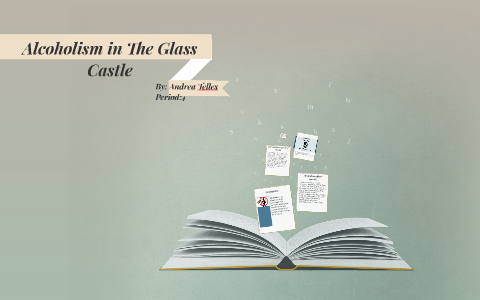
(pg. 61; This idea of the boundary between turbulence and order parallels the lives of the Walls children.)
7. “Mom gave me a startled look. I’d broken one of our unspoken rules: We were always supposed to pretend our life was one long and incredibly fun adventure.”
(pg. 69; This comment shows how Jeannette’s parents do not want their children to ever voice the truth about their lives.)
8. “In the pitch-black night, there is nothing to look at but the road ahead, lit by the car’s headlights.”
(pg. 90; Jeannette makes this observation as they leave Battle Mountain and head for Phoenix.)
9. “There’s no reason to grieve. We’ve all got to go someday, and Grandma had a life that was longer and fuller than most. And now we have a place to live.”
(pg. 92; This is Mom’s observation when she tells Jeannette that Grandma Smith has died.)
10. “Who cares what they think? None of them had ever had their hand licked by a cheetah.”
(pg. 109; This is Jeannette’s observation when people complain about the family jumping the barrier and touching the cheetah.)
11. “When Dad goes crazy, we all have our own ways of shutting down and closing off, and that was what we did that night.”
(pg. 115; Jeannette makes this comment in response to Dad burning down the Christmas tree.)
12. “You know you’re down and out when the Okies laugh at you.”
(pg. 129; Mom observes this when the poor Oklahomans stare at them sleeping in their car.)
13. “I have to believe they’ll come back . . . If I don’t believe, then they might not return. They might leave us forever.”
(pg. 146; Jeannette makes this comment after Mom and Dad decide to ride back to Phoenix and won’t let the kids go along.)
14. “I got in a fight with the mountain and the mountain won.”
(pg. 169; Dad comes home drunk and badly beaten and this is how he explains where he’s been and what he’s done.)
15. “That’s true, but it could also improve my self-esteem. And at times like these, self-esteem is even more vital than food.”
(pg. 186; This is Mom’s comment when she refuses to sell the diamond ring to buy food.)
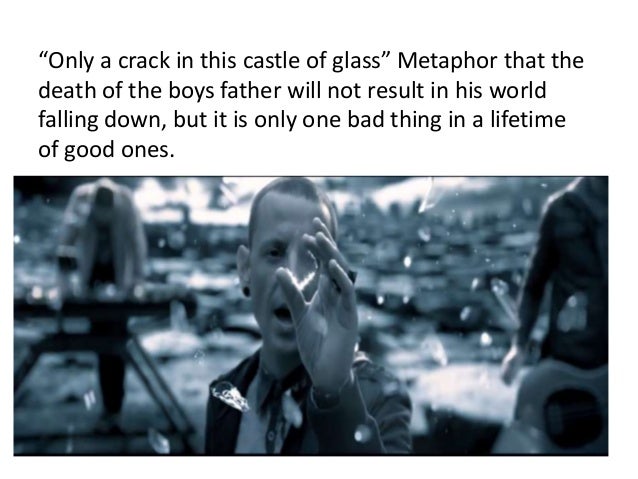
16. Jeannette believes that “a newspaper reporter, instead of being holed up in isolation, is in touch with the rest of the world. What the reporter writes influences what people think about and talk about the next day; he knows what is really going on. She decides she wants to be one of the people who knows what is really going on.”
(pg. 204; This is a summary of everything Jeannette wants to do with her life.)
17. “If you want to be treated like a mother, you should act like one.”
(pg. 219; Jeannette tells her mother this when her mother won’t go to work.)
18. Jeannette “braces herself, expecting to hear a scream, but there is only silence and then a small, broken whimpering.”
(pg, 228; This occurs after Jeannette tells Lori that Dad has stolen all their money.
19. “I’m not upset because I’ll miss you. I’m upset because you get to go to New York, and I’m stuck here. It’s not fair.”
(pg. 237; This shows Mom’s supreme selfishness.)
20. “. . . as soon as I finish classes, I’m getting on the next bus out of here. If the bus stops running, I’ll hitchhike. I’ll walk if I have to. Go ahead and build the Glass Castle, but don’t do it for me.”
(pg. 238; This is how Jeannette finally convinces Dad she’s leaving for New York.)
21. “The homeless sometimes get the lives they want.”
(pg. 256; Jeannette makes this observation to her Political Science professor from her own experiences.)
22. “All those years in Welch with no food, no coal, no plumbing, and Mom had been sitting on land worth a million dollars.”
(pg. 273; Jeannette shows how appalled she is to discover had had this kind of money all along.)
23. After Maureen’s arraignment, the entire family becomes enraged with each other, “giving vent to all the years of hurt and anger, unloading his or hurt accumulated grievances and blaming the others for allowing the most fragile one of us to break into pieces.”
(pg. 276; This occurs after Maureen’s trial.)
Downloadable / Printable Version
The Glass Castle by Jeanette Walls Free BookNotes Summary
Clapsaddle, Diane. 'TheBestNotes on The Glass Castle'. TheBestNotes.com. . <% varLocale = SetLocale(2057) file = Request.ServerVariables('PATH_TRANSLATED') Set fs = CreateObject('Scripting.FileSystemObject') Set f = fs.GetFile(file) LastModified = f.datelastmodified response.write FormatDateTime(LastModified, 1) Set f = Nothing Set fs = Nothing %> |
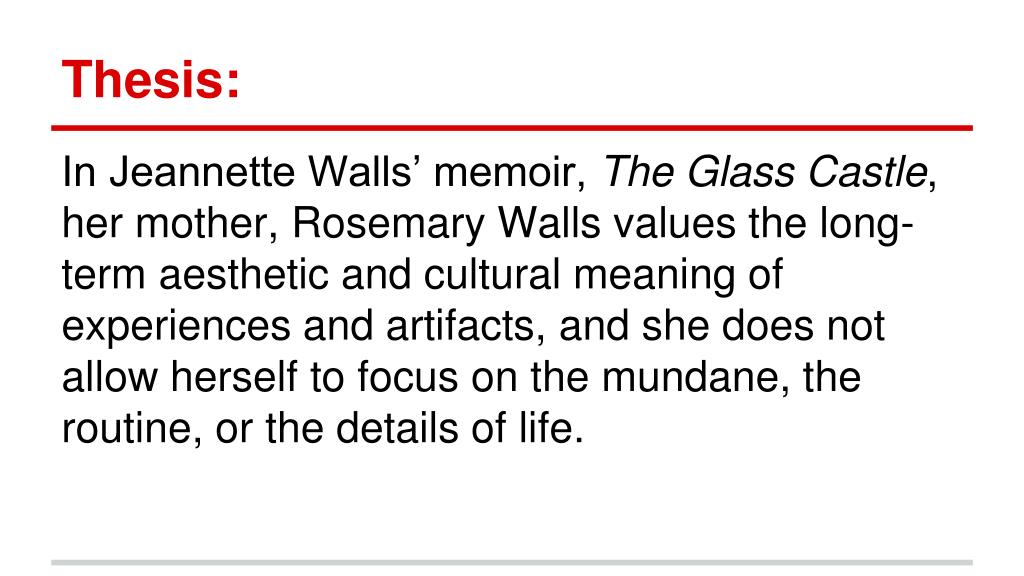 Free Study Guide for The Glass Castle by Jeanette Walls
Free Study Guide for The Glass Castle by Jeanette WallsDownloadable / Printable Version
THE GLASS CASTLE CHAPTER SUMMARY BY JEANETTE WALLS
PART TWO - THE DESERT
SECTION NINE (Pages 39-41)
Summary
This section begins with Jeannette’s assertion that she never believed in Santa Claus, because Mom and Dad refused to allow it. As a result, they celebrate Christmas the week after the actual day, so they can use discarded wrapping paper and ribbon. This year, Dad had lost his job, so there is no money for gifts. So that night, he takes the kids outside, wrapped in blankets, and they are told to pick out a star that they can have for keeps. It is their Christmas present. Jeannette picks Venus, which glows brighter than the other stars, and Dad gives in and says she can have a planet instead of a star. Over Christmas dinner, they discuss outer space, and Dad explains what he knows about the stars and the planet they chose. He tells them also how lucky they are to get the stars instead of cheap plastic toys, “Years from now, when all the junk they got is broken and long forgotten, you’ll still have your stars.”
Notes
Once again, Dad finds a unique way to substitute for his inability to financially provide for his children. He gives them stars, which is ironic, given that that phrase implies the best and yet his idea of a gift doesn’t fit the phrase.
SECTION TEN (Pages 42-47)
Summary
The family has moved to Blythe, and Dad and Mom get into an argument over how long she’s been pregnant. She claims that she always carries children longer than most women. In fact, she believes that she carried Lori for fourteen months. Dad says she’s crazy and that she would be an elephant if that were so. Mom claims that’s why her kids are so smart - they are “postmature” rather than premature. The argument grows so severe that Mom eventually runs away from the car. This causes Dad to chase her with the car, calling her vicious names as she name-calls back again. He actually tries to run her down with the car and then corners her against some rocks. He drags her back to the car and throws her in. Everyone sits quietly after all this, except Mom who sobs that she did carry Lori for fourteen months.
Mom and Dad make up the next day, and she even takes the time to cut his hair. However, neither one of them likes Blythe. They think it is too civilized, and Jeannette isn’t happy about having to go to school. Nonetheless, she becomes the teacher pet who raises her hand at every question. A few days after she starts school, she is jumped and beaten by some Mexican girls who don’t like her intelligence and pale white complexion. Dad seems unconcerned, hoping only that she stood up for herself. The next day, the girls are waiting for her again, and she knows she will have to fight. Fortunately, Brian jumps out of the bushes waving a yucca branch. They eventually surround him and begin beating him up while Jeannette hits one of the girls with a rock. It’s enough to make the fight end, and Brian leads Jeannette through a chain link fence that surrounds a lettuce farm. They gorge themselves on the lettuce and then have a lettuce fight. They run for home while a crop duster drops a fine dust on their heads.
Two months after they move to Blythe, Mom gives birth when she believes she is twelve months pregnant. A few days after the baby is born, Dad takes the kids in the car to pick up Mom and the baby. They leave the hospital Rex Walls-style: walk out and don’t pay. Jeannette is declared old enough at six to hold the baby all the way home. It’s a little girl, but she goes without a name for weeks. Eventually, Mom decides to call her Lily Ruth Maureen after Mom and Dad’s mothers’ names. However, they will call her Maureen, a diminutive of Mary, Mom’s own name.
Notes
This section is a commentary on violence. Jeannette is beaten for being too white and too smart. Dad beats Mom for being too insistent that she carries her babies longer than most people. In both cases, the violence is totally unnecessary, just gratuitous violence without meaning or impact. It contrasts then with the miracle of Maureen’s birth.
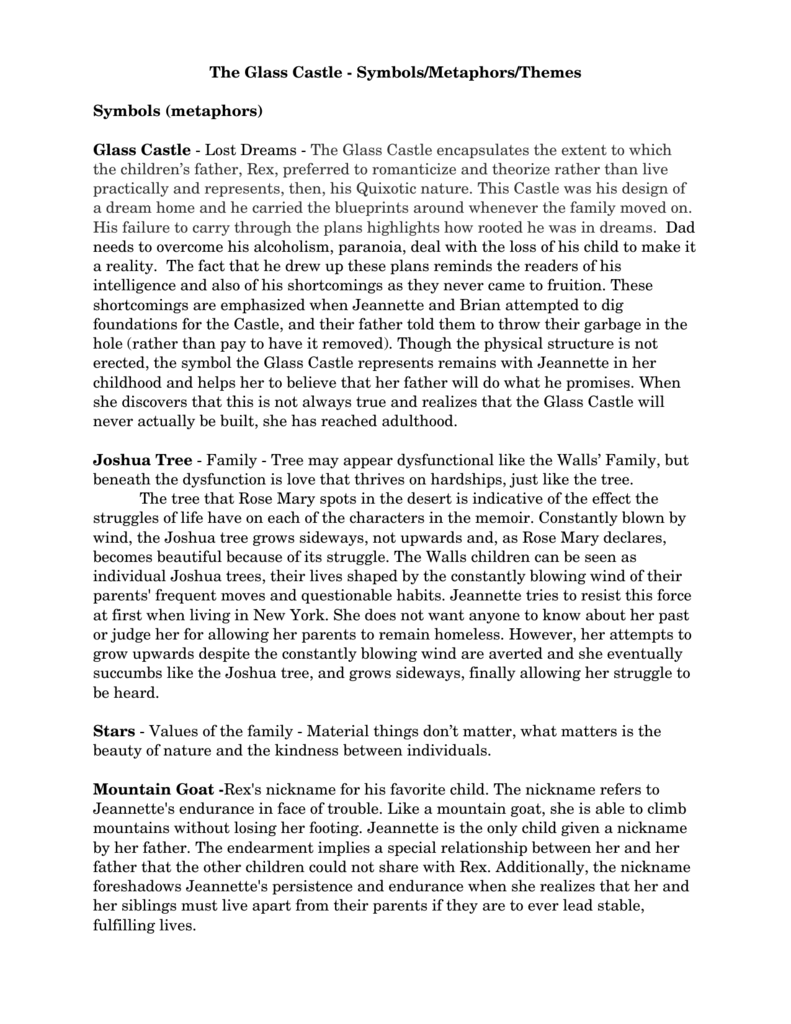
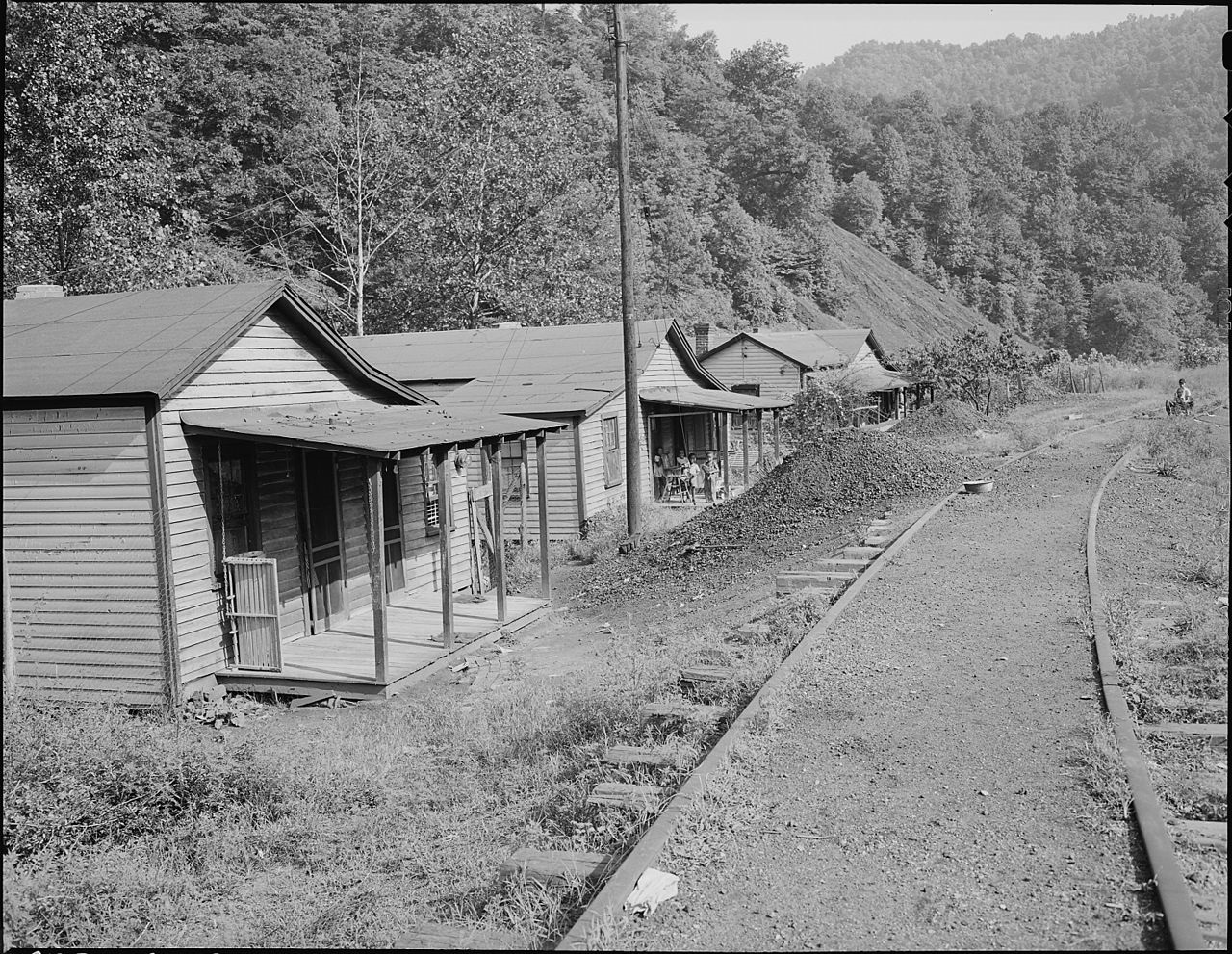
Downloadable / Printable Version
What Does The Glass Castle Represent
The Glass Castle by Jeanette Walls Free BookNotes Summary
Clapsaddle, Diane. 'TheBestNotes on The Glass Castle'. TheBestNotes.com. . <% varLocale = SetLocale(2057) file = Request.ServerVariables('PATH_TRANSLATED') Set fs = CreateObject('Scripting.FileSystemObject') Set f = fs.GetFile(file) LastModified = f.datelastmodified response.write FormatDateTime(LastModified, 1) Set f = Nothing Set fs = Nothing %> |
Glass Castle Title Meaning
